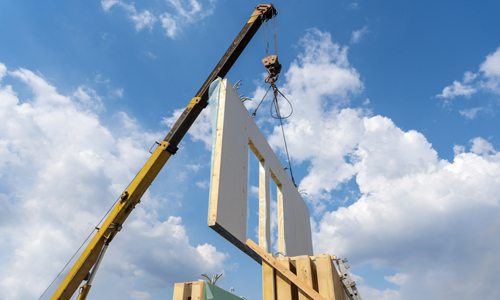You might be forgiven for thinking the Government target of
building 300k new houses this year won’t be met
#construction #construction industry #mmc #skills shortage #architects #local authorities #contractors #design @jmsengineers #planning
For building firms who were already struggling to stay ahead of deadlines, the Coronavirus pandemic couldn’t have come at a worse time. Sudden skill shortages, site shutdowns and reduced productivity have caused serious (and costly) delays. So with all this going on, you might be forgiven for thinking the Government target of building 300k new houses this year won’t be met.
But for Andy Kenyon, JMS Midlands Director of engineering consultancy JMS, failure is not an option. “Those targets are important,” says Andy. “Not only to avert the housing shortage crisis, but also as the foundation of the UK’s economic strategy of investment in infrastructure and housing.”
“The construction industry needs to play its part in creating the V-shaped recovery our economy needs. And thanks to our decade-plus experience in working with MMC, we believe we can enable our industry to meet those ambitious housing and infrastructure targets.”
Fabricating a stronger future
Andy is clear on the opportunities MMC presents: “At JMS, our ethos has always been to look at difficult problems, and find the required solutions. MMC can not only cut timeframes, but deliver projects on budget, and requires less on-site labour while offering greater sustainability.”
MMC, or Modern Methods of Construction, refers to off-site construction, using factory conditions and mass production techniques. Pre-made modules are then delivered and fitted into place on site.
“Many construction firms still rely on bricks and mortar construction, but it isn’t a great fit with where the UK needs to be on housing. And even less so now that Covid-19 has reared its ugly head. In places like Scandinavia and Japan, MMC is already widely adopted, but we have been much slower to embrace this innovative approach in the UK.”
JMS are veterans of designing structures using MMC materials, and have supported industry manufacturers since 2005. “Right from the pre-planning stage, we can dramatically reduce delivery times, and still exceed efficiency targets. It’s a scalable process too, and a solid way for firms to enhance their reputation with clients.”
“One of the concerns we hear from building contractors is that MMC relies too heavily on mass production. They worry it can limit their ability to make buildings look different. But it isn’t a one size fits all solution. Take our work with Ideal Building Systems, for example. Over many single and multi-storey projects, we’ve played a key role in creating substructures and superstructures, often for schools. And every design was adjusted to suit the ground conditions on each site.”
“One of the key advantages of our input was all the pre-design work we did before the building stages meant we could incorporate sustainable drainage. And while our pre-planning took more time than with the traditional building approach, that time was more than made back with reduced waiting times for delivery, and the reduction in on-site expertise required. Nobody had to wait for someone else to finish their job before they could get to work, as all that was done in the factory environment before delivery to the site.”
Andy believes Covid-19 may be the big event that finally breaks the UK construction industry’s reliance on bricks and mortar. “It’s a necessity at this point. This infrastructure and housing needs to be built, and to meet those targets we have to embrace the innovation that MMC offers. Even at the structural design stage, our early input can identify and remove barriers to project completion before they cause headaches down the line.”
“At JMS we have invested heavily in the latest tech and design software, and my team are already MMC veterans, having designed everything from pre-cast foundations and SIPs to steel frames and much more beyond. I am very excited about the places MMC will take the construction industry over the next decade. Not only will we change the landscape, but we will also change the economic outlook for the country. And that can only be a good thing.”
With the introduction of Modern Methods of Construction, maybe Boris might meet his housing targets after all.





Leave a Reply
Want to join the discussion?Feel free to contribute!